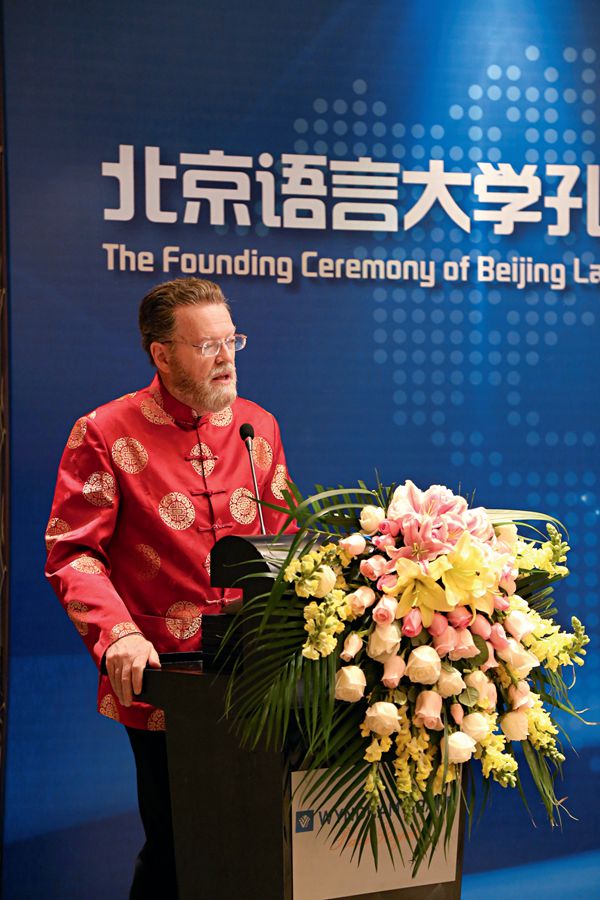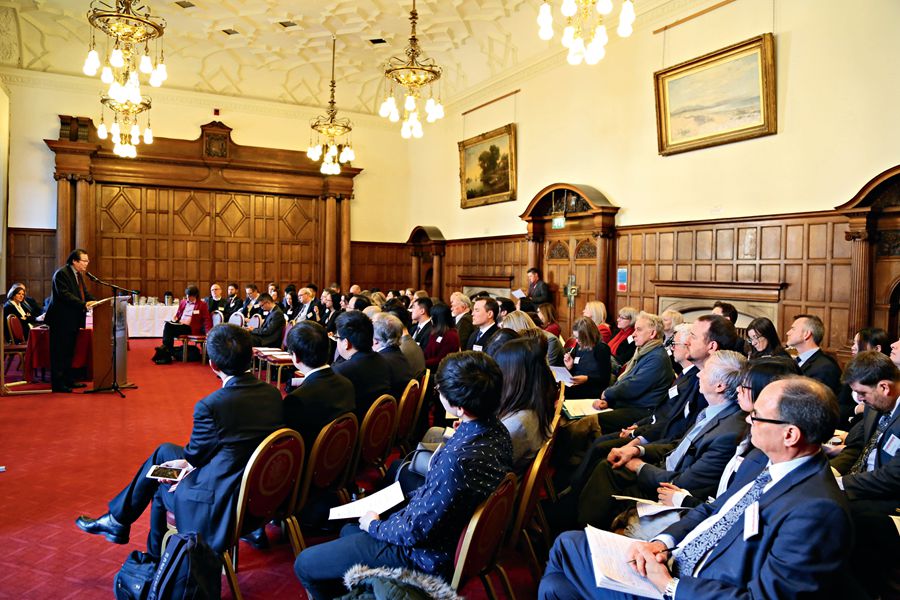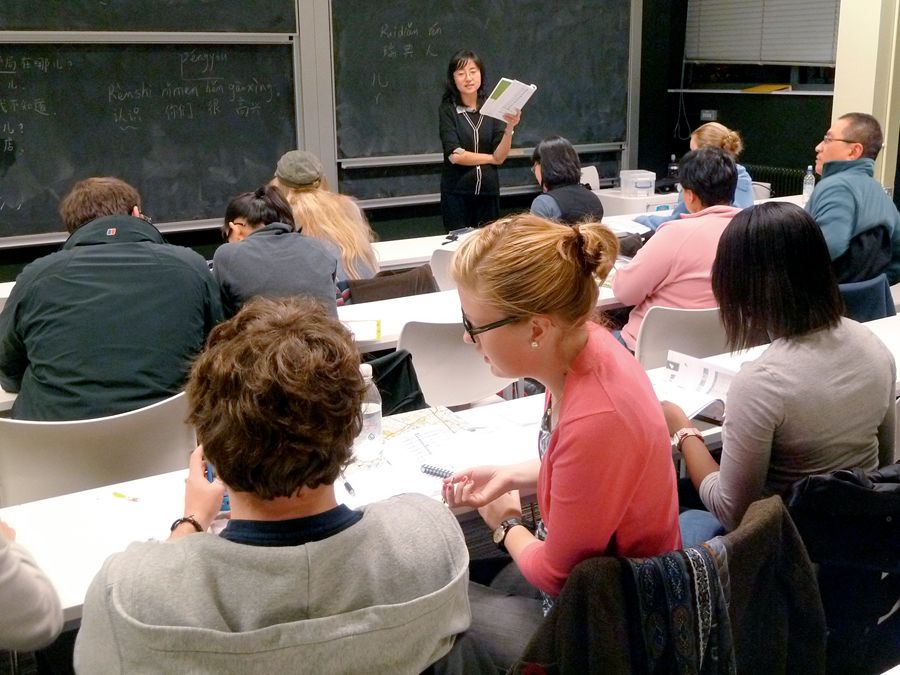AT the 13th Confucius Institute Conference held in Chengdu, capital of southwest China’s Sichuan Province, Professor Sir Keith Burnett, former president and vice chancellor of the University of Sheffield and a member of the Council of Confucius Institute Headquarters, told China Today his experience with China and Chinese people.
Sir Burnett boasts numerous honorary titles: fellow of the Royal Society, president of the U.K. Science Council, and chairman of Advanced Manufacturing Research Center (AMRC) with the University of Sheffield, which is dedicated to fostering scientific innovation. Having developed an interest in Chinese language and culture at an early age, Sir Burnett educated himself into a British chancellor speaking fluent Mandarin.
Cross-Cultural Exchanges
When he was a boy, Sir Burnett had already heard about the Great Wall in China. At present, China is world famous for its capabilities of building infrastructure like bridges, but in the history of cultural exchanges, “The most important bridges were not the ones built from steel or stone, but those connecting hearts to hearts,” said Sir Burnett.

Professor Sir Keith Burnett, former president and vice chancellor of the University of Sheffield and a member of the Council of Confucius Institute Headquarters.
“If we don’t learn from each other, we won’t be able to serve the people, or learn from each other’s insights and knowledge,” Sir Burnett added, recalling that as early as in 2007, this open-mindedness and aspiration for mutual understanding prompted the establishment of the Confucius Institute at the University of Sheffield in joint efforts with the Beijing Language and Culture University and Nanjing University, a bridge that connects people of the two nations. Besides cooperation with schools that offer Chinese courses, the institute is striving to promote mutual understanding between engineers, scientists, and entrepreneurs in the two countries, and to further deepen the friendships among business partners.
“It’s a very big role that the Confucius Institute is playing across the world, starting with language teaching, as it is really important for people to know the language,” Sir Burnett further elaborated. “But it is also important for them to meet with those teachers at the Confucius Institute, who are truly ambassadors of China. The community residents can feel their kindness and devotion.”
Sir Burnett then introduced Dr. Zhao Xia, or Lucy Zhao, director of the Confucius Institute at the University of Sheffield, to the reporter, “Lucy and the teaching staff have made great contributions to support China-U.K. business and cultural activities, not only serving the students, but the whole community as well.”
Born in 1978, Zhao has witnessed the past four decades of China’s reform and opening-up.

Confucius Institute cooperates with the Sheffield Town Hall to convene a forum on China’s Belt and Road Initiative and the U.K.’s Northern Powerhouse.
Zhao, also director for China Affairs in the Chancellor’s Office of the University of Sheffield, teaches at the School of East Asian Studies, and assists in establishing connections between the University of Sheffield and Chinese partners.
According to Zhao, the curriculum of the Confucius Institute at Sheffield is designed to meet needs of people at different levels. For example, it offers Chinese language courses for college students, teaching staff and local residents, business Chinese courses for local government officials and businesspeople, culture classes featuring Chinese martial arts, dance and arts, as well as bilingual parent-child courses for toddlers and young children. Over the past decade, the Chinese Corner has been bringing people together by offering a platform for them to know each other, explore Chinese language and culture together, and become friends with people of kindred spirits.
Cross-culture communication and second language acquisition is Zhao’s research focus. Giving full play to her expertise, she is expanding a research project on Chinese language acquisition among local children aged five to 16 conducted by the Chinese University of Hong Kong to include babies and toddlers below three years old. Through the quantitative and qualitative analysis on linguistic inputs by parents and the children’s responses based on data collected from her parent-child bilingual classes, she works to find the most effective way in fostering children’s abilities in language learning.
A First-Class Innovation Zone
Zhao told the reporter, the Confucius Institute at the University of Sheffield has already become the hub for Chinese and British linguistic communication in the central and northern parts of the U.K. In recent years, it has actively promoted Chinese culture, provided language teaching courses to schools, business organizations and private groups; strengthened connections between local businesses and their Chinese counterparts in sectors like industry, commerce and medical care, and hosted over 20 business forums.
“The Confucius Institute has made tremendous contributions to the community, and also helped establish close ties between universities and their partners. We aim to build the bridge for mutual communication and join hands in establishing a better society,” Sir Burnett said.
Science and technological innovation has always played a vital role in reinvigorating the economy in the history of the U.K. The government has invested a large amount of capital in this area and established seven world-class technology innovation centers, officially known as, “Catapult Centers,” among which the University of Sheffield houses two – AMRC (Advanced Manufacturing Research Center) and Nuclear AMRC. The Confucius Institute helps build a link between Chinese and British industries, as well as promotes the seamless connection between industries and scientific research.
“Nowadays, dozens of Chinese enterprises have become involved,” Sir Burnett explained. AMRC was jointly set up with the Boeing Company in 2001 by pulling together research excellence of the university and resources in the local manufacturing sector. It serves as a knowledge sharing platform for reviving manufacturing businesses of any size, playing a core role in the U.K. Northern Powerhouse scheme, which aims to boost local economy by investing in skills, innovation, transport and culture.
AMRC now has hundreds of industrial partners ranging from global giants like Boeing, Rolls-Royce and British Aerospace Systems to medium-sized and small local enterprises, upgrading in the process from a research center to a world-class innovation center.
“From now on, we will push boundaries among the laboratory, classroom and factory. For instance, in the AMRC Factory 2050, you can see entrepreneurs, scientists, engineers, Ph.D. students majoring in artificial intelligence, and apprentices working in a cooperative way,” Sir Burnett said. “This is an inspiring notion. I am excited that China’s Ministry of Industry and Information Technology, together with our other partners and sponsors, are passionate about making it true. This model will lead the trend of future education.”

Foreign students learn Chinese through evening classes at the Sheffield Confucius Institute.
Common Dreams
“Chengdu is a sister city of Sheffield. Over the past decades, Chengdu, as most Chinese cities, has undergone tremendous changes, and people’s living conditions are becoming increasingly better. Kids in this city live in prosperity and share the opportunity their predecessors could never imagine.” Talking about China’s rapid development, Sir Burnett cited Chengdu as an example. “Instead of making steel, factory workers now devote themselves to the production of automobiles, airplanes and high-speed trains. Electric vehicles are not just seen in China, a country once known for its ubiquitous bicycles, but are sold around the world.”
“Located in Asia, a rapidly developing continent, China, as the world’s second largest economy, is leading the Asian people toward prosperity, and promoting trade and commerce among nations involved in cooperation under the Belt and Road Initiative. Chinese universities have matured to become major centers for advanced research, and the destination for international students.” Sir Burnett expressed his great wish, “The Confucius Institute is a bridge for us to promote mutual cooperation, thus providing opportunities for both our schools and students to actively rise to global challenges and create new products and fortunes.”

Sir Keith signs the memorandum of understanding on cooperation with the Confucius Institute Headquarters at the 9th Confucius Institute Conference.
Sir Burnett underlined that both Chinese and British enterprises are facing the challenges of industrial restructuring. A large number of manufacturing workers will need to look for opportunities elsewhere. Hence, people should rethink how to train those workers so they can make high value-added products. “Universities should undoubtedly take up that responsibility,” he said. “The University of Sheffield works in close cooperation with factories and enterprises, providing employees with practical training courses. There is also great potential for China and the U.K. to work together in this regard.”
“The Confucius Institute has provided targeted services for these key areas such as industry and commerce to expedite cooperation in the field of advanced manufacturing between local businesses and their counterparts in China, one of the most important developing countries in the world with a population of over 1.3 billion,” Sir Burnett said. “During this process, we not only build connections in innovation and trade between the two nations, but also create opportunities for young people in both countries.” In addition, he suggested enhancing talent exchanges among enterprises, as a large number of young Chinese people are studying in the U.K. and are eager for more job opportunities.
The enthusiastic man showed his grandson’s photo, “His father is British, while his mother is Chinese. The little boy thus has family members both in London and Guangzhou.” “There is no difference between the Chinese Dream and the British Dream, the American Dream, or the African Dream. We all hope to create a bright future for our descendants and see them live in a peaceful and prosperous world. The Confucius Institute could help us build a bridge between China and the world, thus making our common dreams come true.”



